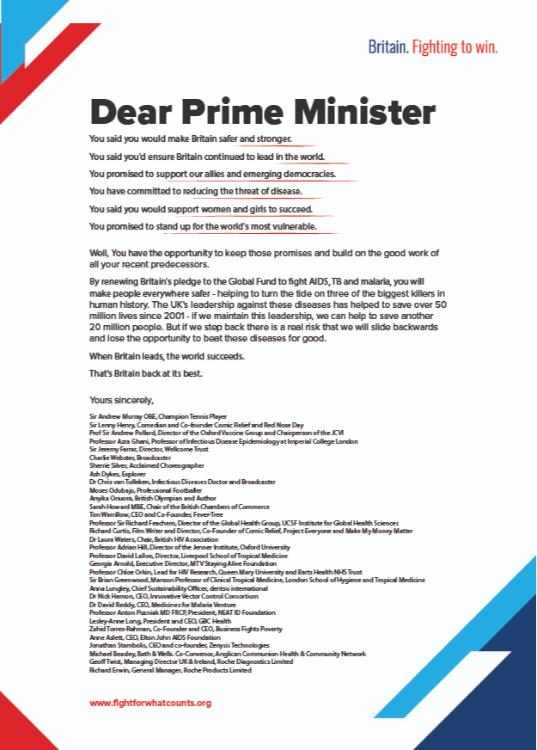Leading British changemakers sign an open letter to the PM
It’s not often that changemakers from the fields of politics, science, sport, business, and entertainment unite to fight for an international cause, but the UK’s critical contribution to the Seventh Replenishment of the Global Fund to Fight AIDS, Tuberculosis and Malaria is one of them.
From tennis star Andy Murray and comedian Lenny Henry to director of the Wellcome Trust Sir Jeremy Farrar OBE and top vaccinologist and director of the pioneering Jenner Institute Professor Adrian Hill, leading lights from their respective fields have signed an open letter to the new Prime Minister supporting what is arguably one of the most critical global health calls in recent years - to defeat HIV, TB and malaria once and for all and protect humanity from the devastating impact of future pandemics.
Usually a top international donor, for the first time in two decades Britain made no pledge at the Global Fund’s Seventh Replenishment Conference, hosted by President Biden last week in New York, leaving Liz Truss’ new government under increasing pressure to make a bold financial commitment in the coming weeks.
The conference has raised US$14.25 billion so far, with G7 allies Japan, Canada, the European Commission, France, Germany and others all meeting the Global Fund’s call for a 30% increase in funding, but the total is still US$3.75 billion short of the target for its next three-year funding cycle.
Historically, the UK is a proud co-founder and third largest international donor to the Global Fund which plays a crucial role in making sure that life-saving innovations get to the right people in the right places at the right time, ensuring that no-one is left behind in the race to wipe out the three killer diseases.
Investing US$4 billion a year to defeat HIV, TB and malaria, the Global Fund partnership has already saved more than 44 million lives since its inception in 2002, reducing the combined death rate by more than half in the countries where it invests.
While death rates from malaria have been slashed in half since 2000, the disease still kills a child every minute and, with COVID-19 bringing unprecedented disruption to malaria services and infrastructure, the urgency with which renewed financial commitments are needed in the fight against one of humanity’s oldest and deadliest diseases is reaching crisis levels.
The UK itself has played a huge role in the fight against malaria for many decades, both through its generous financial commitments to organisations like the Global Fund, and its world-leading capabilities in science and medicine.
Indeed, in 2019 the government made a clear pledge to continue to ‘lead the way in malaria eradication’ in the Conservative Party Manifesto, and recent years have seen the unprecedented development of not one, but two, potentially game-changing British malaria vaccines; RTS,S from GSK is the first ever malaria vaccine to be approved by the World Health Organisation (WHO), and the R21 vaccine from Oxford University’s Jenner Institute which is showing promising high efficacy ratings in trials in African children. The roll-out of next-generation mosquito nets developed by Innovative Vector Control Consortium in Liverpool also took place this year, with initial studies reporting an incredible overall 44% reduction of malaria cases in young children in Tanzania.
The Global Fund has been a truly integral part of making sure that these life-saving innovations have the funding they need to be both tested at scale and distributed to the communities who need them most. Without the UK government’s support to the Global Fund, many of these tools would still be researched, developed, and studied, but would end up sitting on shelves.
To cut the death rates across the three diseases by 64% and ensure that a further 20 million lives are saved by 2026, this year the Global Fund is aiming to raise a total of $18 billion - the minimum required to get the world back on track toward ending three of the world’s most deadly infectious diseases – with a call for all donors, including the UK, to step up their previous commitments by 29%.
Approximately $6 billion of the total is earmarked to be invested in reinforcing global health systems, which is key to building pandemic preparedness.
The British public has much to be proud of for our country’s part in helping to fight COVID-19, with recent YouGov polling showing that three quarters of Brits (74%), including 72% who voted Conservative in the 2019 General Election, wanting to see global leadership from the UK’s next Prime Minister in fighting global diseases, and 80% thinking it’s important to continue to invest in preventing malaria.
This will be one of the new PM’s first foreign policy tests – for the sake of millions of children’s lives, global health security, and British relations with its closest ally, it’s a test they cannot fail.

